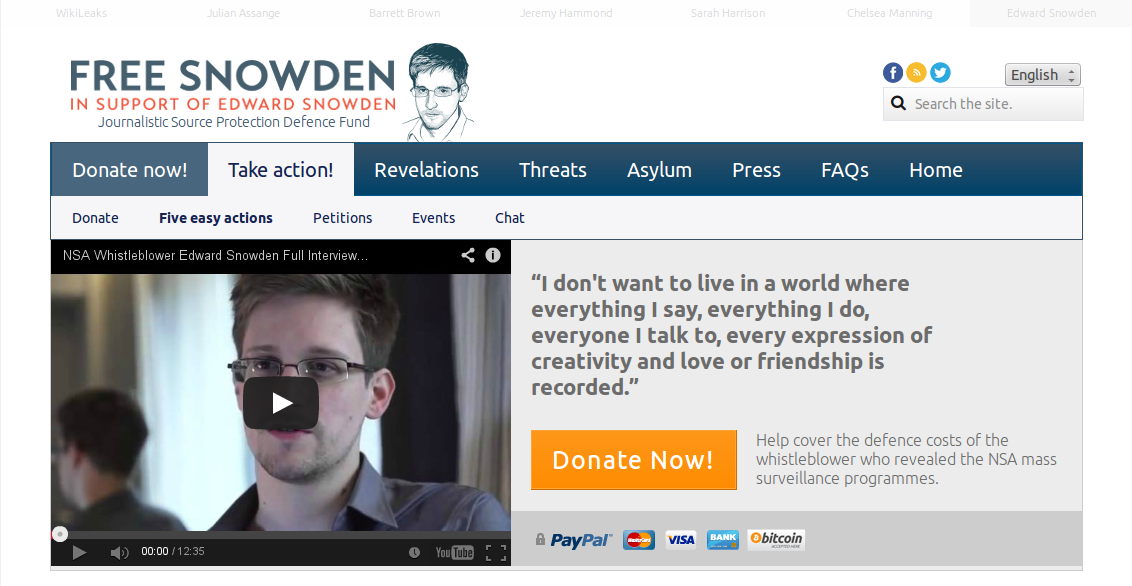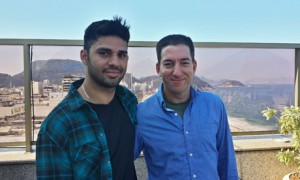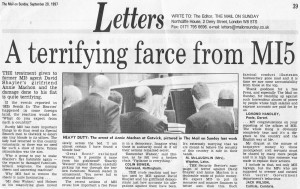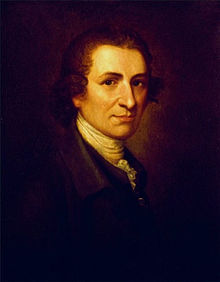First published on RT Op-Edge.
In the UK last week there was a series of events to celebrate the wonderful work of whistleblowers.
In previous decades these brave and rare individuals have often been all too easily dismissed with the usual, carefully orchestrated media slanders of “disgruntled”, “too junior”, “sacked”, whatever ad nauseam. But no longer.
Now, in this era where we have been lied into illegal wars, where the banks privatise their profits yet make their risks public and get repeatedly bailed out, and when people are needlessly dying in our hospitals, more and more people realise the value that whistleblowers can bring to the public debate.
Indeed, the system is now so broken that the whistleblower is often the regulator of last resort.
Plus, of course, this is the era of Wikileaks, Chelsea Manning and Edward Snowden. The concept of whistleblowing has gone global in response to the scale of the threats we are all now facing from the military-security complex world-wide.
So last week was rather invigorating and involved a number of events that gave due credit to the bravery and sacrifice of whistleblowers.
First up we had the international launch of the UK whistleblower support group, The Whistler. This is a British organisation designed to provide a legal, psychological and social support network to those in the UK brave enough to come out and blow the whistle on incompetence and crime from any sector, public or private, and many hundreds have over the last few years, particularly from the financial and health sectors.
Sadly all experience the same treatment; vilification, suppression, and even the loss of their careers for daring to expose the incompetence and even crime of others. Sadly, while there is a law in place that is supposed to provide some protection, all to often this has failed over the last 16 years. The Whistler provides a much needed service.
A number of international whistleblowers were in the UK for the week for other events, and The Whistler was able to host them and hear their stories. Gavin MacFadyen of the Centre for Investigative Journalism, and the indefatigable campaigner Eileen Chubb hosted the event, and former CIA analyst Ray McGovern, NSA whistleblower Tom Drake, Jesselyn Radack of the Government Accountability project (The Whistler’s US counterpart), and myself spoke. The Whistler will officially be launched in the UK on 20th March, so watch this space.
The next night we found ourselves at the prestigious Oxford Union Society, which was kind enough to host the award ceremony for the Sam Adams Associates for Integrity in Intelligence for the second year running. You may remember that last year the award went to Dr Tom Fingar, whose US National Intelligence Estimate of 2007 single-handedly halted to rush to war against Iran.
The Sam Adams Associates is a group of intelligence, government and military whistleblowers and campaigners. Each year we vote to confer an award on a member of the intelligence community or related professions who exemplifies CIA analyst, Sam Adams’ courage, persistence and telling truth to power, no matter what the consequences.
Since its inception in 2002, the award has been given to truth tellers Coleen Rowley of the FBI, Katherine Gun of GCHQ, Sibel Edmonds of the FBI, Craig Murray former UK ambassador to Uzbekistan, Sam Provance former US army Sgt, Major Frank Grevil of Danish intelligence, Larry Wilkerson former US army Colonel, Julian Assange of Wikileaks, Thomas Drake of NSA and Jesselyn Radack of the Department of Justice, Dr Thomas Fingar former Deputy Director of National Intelligence, and Edward Snowden former NSA contractor.
This year the award went, unanimously and inevitably, to Chelsea Manning, and many Sam Adams associates travelled to the UK to attend and to honour her achievements and 2013 SAA laureate Edward Snowden sent through a congratulatory message. Sadly and for obvious reasons Chelsea could not receive the award in person, but her old school friend, Aaron Kirkhouse read out a powerful and moving statement written by her for the occasion.
The following night the Union hosted a debate on “This house would call Edward Snowden a hero”. I had the pleasure of arguing for the proposition, along with US journalist Chris Hedges, NSA whistleblower Bill Binney, and former UK government minister Chris Huhne, and we won — 212 to 171 was the final tally, I believe.
I very much enjoyed the events, so a massive thanks to Polina Ivanova, the current Union president, and her team who organised the events.
The best part of the week though, apart from the set events, was having the time to be with other intelligence whistleblowers and fellow campaigners. While in London we also all had the opportunity to do a range of media interviews with programmes such as Brian Rose’s London Real TV and Afshin Rattansi’s “Going Underground” on RT.
Sadly but rather predictably, the old media chose not to take advantage of such a rich source of expertise in town. Despite repeated invitations, the MSM failed to attend any of the events or interview any of the whistleblowers. But perhaps that’s better than the appallingly off-beam coverage the Guardian gave to Dr Fingar’s award ceremony last year.
But the old media are behind the times, which are definitely a’changing. In this post-Wikileaks, post-Manning and post-Snowden world, the tone of the debate has changed for good. Whistleblowers are increasingly valued as brave individuals of conscience and there is much more awareness and interest in the issues of privacy, human rights and the meaning of democracy. Indeed, in the fundamental meaning of freedom.









